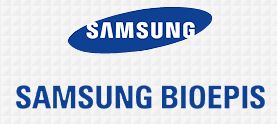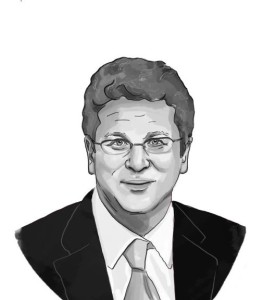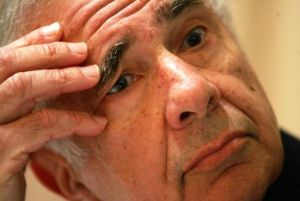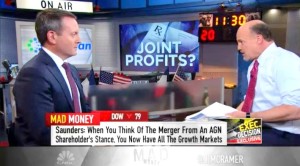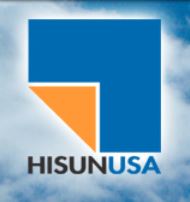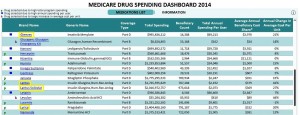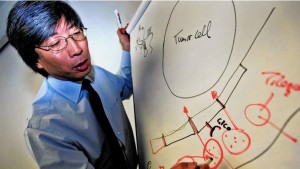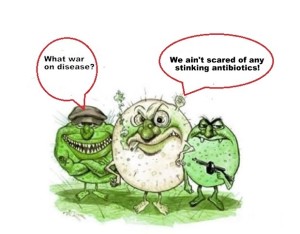- Samsung and Biogen win first EU approval for an Enbrel copycat (fiercebiotech.com)Samsung Bioepis Enters the European Biopharmaceutical Market with Benepali®, the First Fusion Protein Biosimilar Approved by the European Commission (finance.yahoo.com)
A joint venture between Biogen and South Korean giant Samsung won Europe's first approval for a lower-cost version of Amgen and Pfizer's blockbuster Enbrel, planning to launch its injection in the coming weeks...The two companies, doing business as Samsung Bioepis, convinced European regulators to clear their Benepali for all of Enbrel's approved indications, including rheumatoid arthritis, psoriatic arthritis, spondyloarthritis and plaque psoriasis…As for Amgen...believes its hold on Enbrel's U.S. rights will keep it safe from a biosimilar challenge in the coming years. In 2011, Amgen secured new patents related to the antibody that the company says will protect the treatment from competition through 2029. Novartis, leading the charge among Enbrel biosimilars developers in the U.S., is hoping to win approval for its version of the treatment this year while mounting a legal challenge on those patents.
- Reuben Guttman: The lawyer pharma loves to hate (statnews.com)
Reuben Guttman wants us all to be concerned about what’s in our medicine cabinets. A Washington lawyer who specializes in prosecuting pharmaceutical fraud, Guttman has gone after Pfizer, Abbott, GlaxoSmithKline, and several other top drug makers — and he usually wins big, recouping billions of dollars for federal and state governments...STAT talked with Guttman about bad behavior in the drug industry, and whom he trusts for his own medical care.
- The lawsuits you’ve won often center on unlawful marketing and kickback schemes. How widespread are these practices?
- How does your work as a lawyer impact the health care system?
- And the consequence for patients?
- Is there anything patients can do to protect themselves?
- Knowing what you know, do you avoid doctors and hospitals?
- What’s the next big pharma scam?
- What do you do in your spare time?
- Are you an athlete yourself?
- When you were a kid, did you fantasize about being a whistleblower attorney?
- Icahn: Change the international tax code, and Pfizer will drop its ‘travesty’ of a merger (fiercepharma.com)How to Stop Turning U.S. Corporations Into Tax Exiles (nytimes.com)
The tax benefits of buying Allergan are Pfizer's No. 1 reason for doing the $160 billion deal. In fact, some analysts see the $2 billion in potential tax savings as the merger's only substantial advantage...Activist investor Carl Icahn is one of those detractors, and on Monday, he amped up the criticism..."The Pfizer-Allergan deal is a travesty," Icahn wrote in a New York Times op-ed. "The point isn't to find corporate synergy. It is to leave behind our uncompetitive international tax system."...But what if those tax savings were moot?
- Allergan CEO on the world’s largest pharma merger (cnbc.com)
Last week, Jim Cramer learned that the much-discussed merger between Allergan and Pfizer is really happening. This would create the world's largest pharmaceutical deal, with $160 billion in an all stock transaction…The deal stipulated that Allergan shareholders would receive 11.3 shares of Pfizer for every one share of Allergan…"Even though I think this is a very smart deal, one that will give Pfizer a tremendous pipeline of new drugs along with a lower Irish corporate tax rate, the market initially seemed pretty skeptical,"…Allergan's stock initially sold off on the news, as investors worried what could be in it for them on the deal. However, since that time the stock has rebounded…many questions remain on how the transaction will reward Allergan shareholders, given how much the company already has going for it on its own. That is why Cramer decided to go straight to the source, and spoke with Allergan's CEO Brent Saunders.
- FDA castigates China’s Zhejiang Hisun for ‘systemic data manipulation’ (fiercepharmamanufacturing.com)
A Chinese drugmaker that has a joint venture with Pfizer to produce generic drugs and plans to separately make biosimilars, has been savaged by the FDA in a warning letter for serious data manipulation and shipping to the U.S. products that repeatedly failed follow-up testing by customers...A warning letter posted by the FDA today shows why the agency last September decided to ban products coming out of the Zhejiang Hisun Pharmaceutical plant in Taizhou City. "We observed systemic data manipulation across your facility, including actions taken by multiple analysts, on multiple pieces of testing equipment, and for multiple drugs,"...its concerns over data manipulation were "heightened by the significant number of customer complaints for subpotency and out-of-specification impurity levels the company received from 2012-2014." There were more than 60 complaints for impurity problems...The FDA said the explanations that Zhejiang Hisun Pharmaceutical gave for why data was deleted and raw data was no longer available were completely inadequate, as were the responses to other issues. It said it will continue to prevent the company's products from coming into the U.S. until the agency is satisfied with the steps the drugmaker has taken to bring up its manufacturing standards and can convince the FDA that its test data is authentic.
- Big Pharma’s steady double-digit price hikes cost Medicare billions (fiercepharma.com)Medicare drug costs rose sharply in 2014 (statnews.com)Medicare Drug Spending Dashboard 2014 (cms.gov)The CMS Blog: Medicare Drug Spending Dashboard (blog.cms.gov)
Sanofi, Pfizer, Novartis and peers ratchet up prices on blockbuster meds to reap big sales gains…a new report from the Center for Medicare and Medicaid Services puts some numbers to that claim. They won't resolve the debate over which price increases are "justified," but they do highlight some commonly used meds whose sales growth (grew)--and Medicare spending--depends more on rising prices than on rising demand.
- Vimovo...price hike at 543% for 2014... boost helped send spending on the drug up past $38 million from just over $7 million in 2013…patients using the drug only grew by 8%.
- Targretin...unit cost rose by 123% last year, to $145.65...CMS shelled out $73.5 million, more than double its 2013 spending…increase in patients of just 12%.
- CMS laid out $1.725 billion for Lantus last year, a $400 million increase year-over-year despite a 6% decline in patient count.
- CMS spent another $2.02 billion for Lantus Solostar, an increase of almost $700 million, or about 50% year-over-year...patient growth amounted to 13%.
- Gleevec sent CMS' unit costs up by 21% last year, to $179.93...that pushed spending per user to $69,212. The number of patients using the drug ticked upward by 5%...spending on the drug grew by 28%, to almost $1 billion.
- Lyrica...up in price...about 20%...to $4.28 per pill. Medicare spent $1.4 billion on the drug in 2014, up from just over $1 billion in 2013...patients grew by 7%.
When Sanofi, Pfizer and Novartis were raising their prices...they were fighting to fill patent-cliff sales gaps and scrambling to refill their pipelines of prospective new drugs. They were also spending billions on R&D--and on stock buybacks, dividends and other shareholder-friendly moves. Horizon and Valeant, by contrast, aren't big R&D spenders; Valeant, at least, has defended its price hikes as necessary to deliver returns to shareholders.
- Pfizer-Allergan Merger Raises Concerns That Fraud Is Part Of ‘Corporate DNA’ (forbes.com)
The massive Pfizer-Allergan merger is getting a lot of attention. It is one of the largest takeovers ever in the healthcare industry, worth an estimated $160 billion…But consider another number: The amount Pfizer, Allergan and their predecessor companies have paid to settle government healthcare fraud allegations in the US – a total of nearly $4.5 billion. That total doesn’t include close to $1 billion paid to settle related consumer actions…Add to that the six criminal pleas and four corporate integrity agreements that the companies and their predecessor subsidiaries have agreed to, and one might question whether cheating and corruption are part of their “corporate DNA.”… The duo’s “hall of shame” is staggering and impossible to overlook. Here are some of the settlements the two corporations and/or their predecessor companies have paid the US and states:
- Pfizer/Parke Davis/Warner Lambert — $430 million settlement and a criminal plea. (2004)
- Pfizer/Pharmacia & Upjohn Co. — $2.3 billion and a criminal plea. (2009)
- Allergan — $600 million and a criminal plea. (2010)
- (Allergan/Actavis) Forest Labs — $313 million and a criminal plea. (2010)
- Pfizer — $14.5 million. (2011)
- (Allergan/Actavis) Watson Pharmaceuticals — $1.7 million. (2012)
- Pfizer/Wyeth Pharmaceuticals — $491 million and a criminal plea. (2013)
- Allergan/Actavis/Watson Pharmaceuticals — $12.4 million. (2013)
- Pfizer/Wyeth — $35 million. (2014)
- Allergan/Warner Chilcott — $125 million and a criminal plea. (2015)
- Drug Companies to Try a Unified Front Against Cancer (nytimes.com)Rival drug firms team up to test new approach to cancer treatment (statnews.com)
Several leading pharmaceutical companies are joining forces in an effort to speed the testing of new types of cancer drugs that harness the body’s immune system to battle tumors...The cooperative effort, announced Monday, will include Amgen, Celgene, GlaxoSmithKline, Pfizer, Merck...and some smaller companies. The effort, known as the National Immunotherapy Coalition, will try to rapidly test various combinations of such drugs...“The challenge of cancer is far too great for any of us to tackle alone,”...Perhaps the most exciting development in oncology now is the sudden success, after decades of failure, of efforts to unleash the immune system to control cancer...The announcement of the coalition came on the first day of the huge J.P. Morgan Healthcare Conference in San Francisco, when numerous companies make announcements. Besides the coalition announcement on Monday, one company said Sunday it was aiming for what it called the holy grail of oncology — a blood test to detect all cancers at the early, most treatable, stage...
- The top 10 pharma companies in social media (fiercepharmamarketing.com)
Chatting with the public is not in pharma's comfort zone. Drugmakers are adept at the one-way communication known as direct-to-consumer advertising, and some of them deal well with the media. Some even know how to work with patient groups. Back-and-forth with doctors? Pharma's daily bread...But put your average, everyday drug company in the middle of a public conversation, and it freezes up. Worried it will say the wrong thing, sensitive to criticism, mindful of unintended consequences, drugmakers usually prefer to stand by the punch bowl and check their iPhones for messages...You could say pharma has social anxiety...Drugmakers' usual excuse for remaining social-media wallflowers is regulation, or lack of it. The FDA's guidance on the subject is piecemeal and tardy; the agency has slapped companies for overstepping bounds they didn't know existed.
- How Big Pharma Could Lose the War on Disease (bloombergview.com)
The planned merger of pharmaceutical giant Pfizer with competitor Allergan, aimed in large part at cutting the combined company's tax bill, illustrates a troubling trend in the industry: Firms are focused more on pursuing near-term profits than on the difficult, longer-term research needed to develop truly groundbreaking new drugs. This is unfortunate, because disease may be making a comeback…the accelerating spread of multi-drug-resistant bacterial infections. There are now more than two million cases each year in the U.S. alone. Last month, scientists announced that they had found evidence, in farm animals in China, that genes for antibiotic resistance are being transferred directly among different bacteria -- a trick (horizontal gene transfer) that will allow the resistance to spread more quickly than ever before…The pharmaceutical industry's reshaping doesn’t bode well for humanity's ability to respond. Almost all antibiotics in use today were discovered between 1940 and 1960. Research progress since then has been almost nil.

